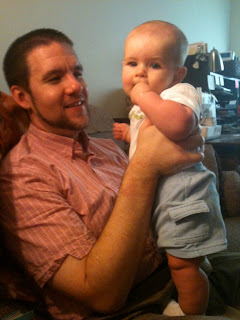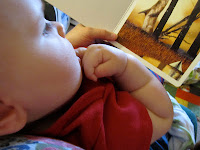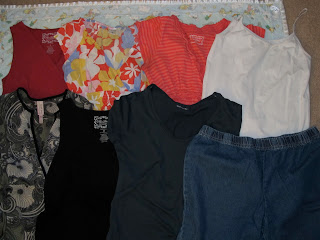This is a general overview of how Hugh and I have decided to "sleep train" Enoch. It is definitely not the only way or the perfectly right way. It may or may not work with our future children, and I'm sure it will ebb and flow with changes as the years pass. For now though, this is how we do it, and I wanted to chronicle it so that I can look back (and also for other new parents so that they can see how sleep training has worked in our family).
I should start by saying that Enoch has and still does sleep in our room. This was out of necessity for us because Hugh's office occupies our second bedroom, and him having the flexibility to work at home was well worth the "sacrifice." (I put sacrifice in quotation marks because honestly it has not been that much of a sacrifice for us to have him in our room so far.) After we move, we hope that he will have a separate room, but for now it's okay. (In my opinion, I may even sleep better like this because I know that I can easily hear any of Enoch's noises and a quick glance from bed allows me to see him. We have also been able to avoid investing in a baby monitor.)

When Enoch was first born, he didn't really like the crib. Maybe because it didn't snuggle him and it was just so hard and flat (that's my motherly opinion). After a few hard nights, we invested in the yellow rocker (
here) that some of our friends recommended to us. It was such a great investment! This worked so well for us because it could sit right beside my side of the bed (eliminating the need to get up each time Enoch woke up to eat) and was easy to rock with my hand or foot. It also snuggled him more than the flat crib mattress. In the daytime we could also drag it into a different part of the house, so it was basically like a portable bassinet that rocked and snuggled. amazing, huh? (more of my thoughts on it
here)
Back to sleep training. I would say that for the
first 6-8 weeks of Enoch's life, we followed this basic routine: eat, wake, sleep (idea from
Baby Wise). At first, it was a short cycle, and we didn't work on training him to sleep at all. Usually we would either rock him to sleep in our arms or put him in his yellow rocker and rock him a little in it. The basic idea during this early time was to get him into the correct cycle of eat, wake, sleep. That was our focus... NOT sleep training.

At around the
2 month mark, we started attempting to sleep train Enoch.
We decided that teaching him to fall asleep by himself was our number one goal. (It's important to set a goal so that you can be sure that the steps you're taking toward that goal are actually
working toward your goal, not some ambiguous goal that you'll never meet.) So after doing some research, this was our process: We followed the same cycle of eating and then being awake/playing. Then, when we saw sleepiness signs (rubbing eyes, yawning, fussiness, etc.) we would rock him for a few minutes and then lay him down awake. Laying him down awake was an important step for us because it tied back into our goal of teaching him to fall asleep by himself (instead of relying on rocking like we had done when he was younger). When we first began this, we would rock him until we were certain that sleepiness had set in (sometimes up to 15 minutes), and as he got better at falling asleep, we shortened the rocking time. Eventually, we did have to start bearing with him crying some, but that was part of him learning to fall asleep by himself.. self-soothing. After the sleep training had begun, we also started transitioning him into napping in the crib so that he would learn to sleep in places other than the yellow rocker. (More on that stage
here.)
Beginning the sleep training was a little daunting at times because it was hard to tell the difference between Enoch's protest cries and his real cries (A protest cry would be, in essence, the same as a 3 year old pouting about not getting his/her way, whereas a real cry would relate to an actual
need for the child). In our experience, protest cries (of a 2+ month old) can be ignored IF you are certain that: his diaper is dry & clean, he is not hungry, he has been fully burped, he is not in physical danger,
and there were no unusual circumstances from that day that might be causing him pain and/or trouble sleeping (vaccinations, bad napping, etc.). If you aren't certain about these things,
it's better to be safe than sorry, especially if you haven't quite decoded your baby's cries. It's also good to show extra grace and patience when you know that your little one might be having trouble getting to sleep because of the day's unusual circumstances.
Finally, once you understand what your baby's protest cry is like, you will most likely run into a more intense protest cry; we called it the "jaguar cry." Now, you may be tempted to think, like we did, that your baby could
never go to sleep once he/she begins the jaguar cry.. you'd better intervene now before it gets worse... Well, you're most likely wrong, like we were. At some point, I would suggest just testing the jaguar cry to see if it isn't possibly just the last little puff of steam that your baby needs to expend before he/she falls asleep. It worked for us, and soon we discovered that Enoch cried less and less each time the jaguar cry started.
As far as sleeping through the night goes, I think that is a relative concept. For us, Enoch was "sleeping through the night" pretty early on, but that was us putting him down around 10 or 11 pm and then him sleeping until 6 or 7 am with one snack in between. (that felt like a huge victory for us!!) For some people, "sleeping through the night" doesn't count until their child goes down at 8 pm and isn't heard from until 8 am. Whatever your definition is, hold to it lightly because most likely your child's sleep patterns will change as they do. :) For example, Enoch was following the above "sleeping through the night" schedule at around 6 or 7 weeks old. He dropped the extra feeding after a few more weeks, but at 3 months old he hit a growth spurt and decided that he did want to nurse in the middle of the night again.. a few times a night. This cycle of 1-3 night time feedings lasted an entire month for us (even though he had completely been done with night time nursing for over a month). I've heard a few times now that babies do not establish their sleep patterns until they are past 4 months, and even then, developmental milestones and growth spurts can temporarily affect them. So hold your night time sleep ideals lightly and instead work toward your personal goal in sleep training.
One last thing, for all of you who are still waking up in the night to feed your little one, I highly recommend picking out some Scripture that is encouraging to you... something related to
endurance or
sleepless nights... Then memorize it. I chose this one because it encouraged me that I had already been granted everything that pertains to life and godliness... even godliness when I was waking up a few times a night to nurse.. so surely I could be a godly night-waking mom with a good attitude even though my sinful desire was to just sleep. :)
His divine power has granted to us all things that pertain to life and godliness, through the knowledge of Him who called us to His own glory and excellence, by which He has granted to us His precious and very great promises, so that through them you may become partakers of the divine nature, having escaped from the corruption that is in the world because of sinful desire.
(2 Peter 1:3-4, emphasis mine)
...And in case you're wondering what the longest time we've ever let Enoch cry for is.. well, I'm honestly not sure. We take each crying session on a case by case basis, making sure to evaluate all of the factors carefully. I would suggest limiting crying based on your comfort levels and your baby. Every baby is different and 15 minutes of crying for one might be equivalent to 45 minutes for another or even 1.5 hours of crying for yet another. One thing that I highly suggest though, when it comes to allowing your baby to cry himself to sleep (aka self-soothing), is to have one other person helping you call the shots. Hugh was a huge help to me in this because we both bring different opinions and ideas to the table, and we also both have different levels of tolerance and sensitivities. :)


















































